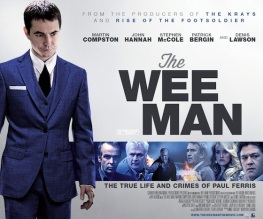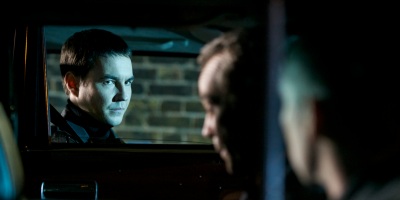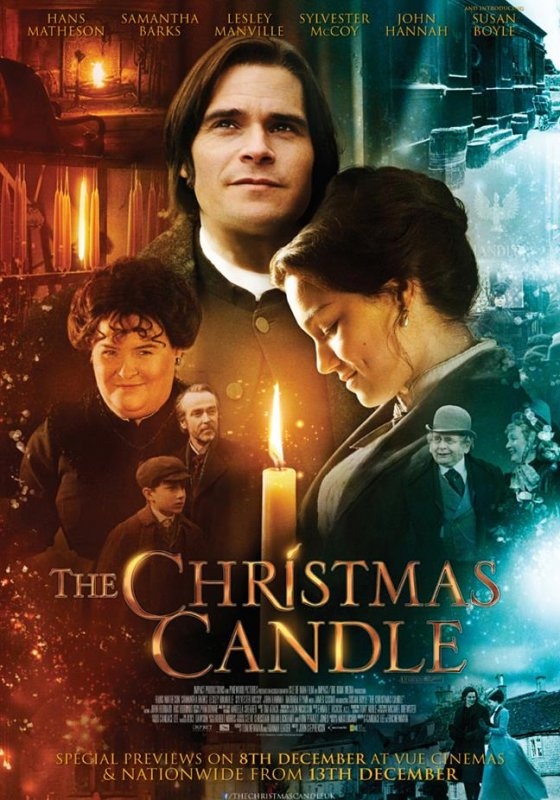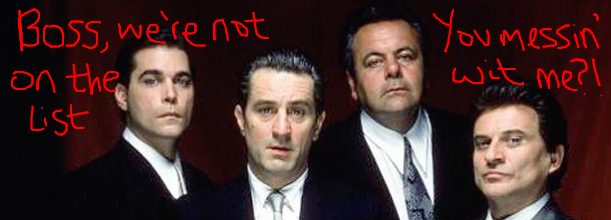The Wee Man

The Wee Man is another true tale of gangsters, following the release last week of Gangster Squad. This time, the action is a little closer to home and the present, being set in Glasgow from the late seventies to the present day. It follows the career of notorious ‘Wee Man’ Paul Ferris (Compston) through a troubled childhood on a Glasgow housing scheme, through love, imprisonment and release, and then apparent public popularity. This, the film relays, was achieved through his rather unbelievable accomplishment of near single-handedly breaking the control of two of the second city’s most powerful crime gangs, while in the process exposing police corruption and the polluting of some kind of criminal ‘honour code.’ Along the way, we are presented with a string of knifings and shootings, all set against the grim background of the streets and pubs of Glasgow’s east end.
The film opens with a montage of the faces of the actors playing the various gangsters we are to meet later in the The Wee Man, without us having any idea of who they are. Their expressions are pretty gruesome. Cut to a lone figure standing in a prison cell, sounds of screaming and pleas for mercy surrounding him. Another prisoner is being attacked by the guards in the next cell. We don’t know why. Then we are straight into a flashback from this still unknown man’s childhood. Alone in his room again, the boy can hear the same sounds that will penetrate his prison cell in the future.
Frightened and confused, the boy questions his father (Denis Lawson, the best thing in the movie). Explaining that the world outside his bedroom is a dark and dangerous forest, Father Ferris imparts to his son the secret of living in this foliaged world unharmed: “There are three simple rules that will help you survive in this scary forest. One, always be wary of strangers. Two, be loyal son, especially to the people you love and trust. And three, be a lion, son.” But won’t people help each other in the forest? His son asks, and Willie Ferris cannot respond, because the sounds of violence his son is hearing are coming from a police van outside, where the officers of the law are meeting out some extra-judicial punishment to another dweller of the wood.
The tired and simple message of such a scene is that childhood conceptions of justice and morality are easily shaped and perverted by the environment around them, and it is as obvious now as it was yesterday, and is no clearer to me having watched this film. In fact, despite the apparent simplicity of the scene just described, The Wee Man still manages to muddle its message of poverty and deprivation breeding cycles of violence by investing so much emphasis in Ferris’ obsession with ‘rules’ and ‘code’. At the end of the film, having vanquished his clichéd crime-lords and avenged the deaths of his more gentle sidekicks, a voiceover explains that he was merely trying to impose some order to all the chaos of the jungle by punishing those who did not stick by the rules. Yet the kind of rules his father preached, and those his mob masters failed to live by, are primarily selfish ones, designed to preserve the self at the cost of the community. If the alternative to selfish killing is only selfish living, then moral deprivation must, by definition, continue. I fear however, I am making this film seem more curious about its implications than it really is.
The Wee Man attempts to create an atmosphere of genre self-reference by emphasising one of the real-life gangsters’ fascination with Coppola’s The Godfather, making the audience aware that all of the other gangsters find this ridiculous. Within this framework, however, The Wee Man undermines itself, often hilariously, throughout, by following exactly the same conventions and tropes that have become so common-place with this sort of film since 1972. Having never heard of Paul Ferris or any of his criminal shenanigans before seeing The Wee Man, however, it is quite possible that The Godfather antecedent was something that the Glasgow gangsters were consciously trying to emulate. If that is the case, then the film certainly failed to convey with any clarity what such a blurring of the boundaries between crime fiction and crime reality means in this context. Perhaps the filmmakers were simply unaware that they were asking the question.
The most interesting aspect of the film was its attempt to lay out a guide to the intricacies of a working class ‘honour code’, one that protagonist Ferris finds empty and hypocritical during his journey through Glasgow crime-land. At one point Ferris plaintively asks ‘The Licensee’ (Hannah), why he couldn’t be satisfied with the slice of the extortion pie that he had, as ‘there was plenty to go around?’ This question surely frames any debate about the economic future of the west just as much as it does the criminal underworld in cities like Glasgow. Indeed, the parallels between the realms of gangsterdom and corporate big-business are too obvious to labour here, but the film could have made itself relevant by even a cursory nod in that direction. It chose not to do so, instead satisfying itself with a gory attempt at urban realism that says more about the intellectual bareness of the writers than the geographical desolation it depicts.







Recent Comments